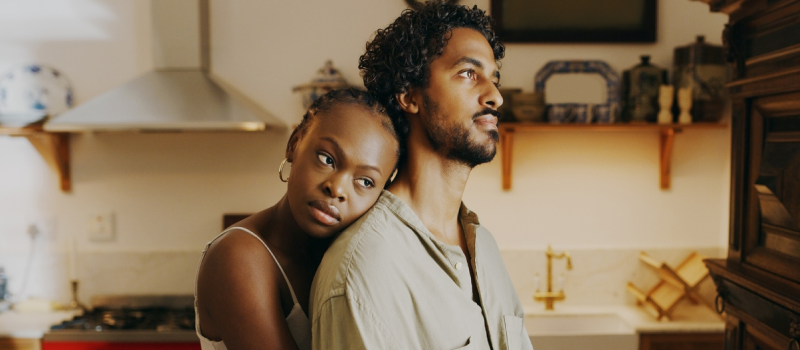
Table of Contents
Does Anxiety Go Away?

Written By: Ethan Cohen BSN, RN

Clinically Reviewed By: Dr. Don Gasparini
June 10, 2023
8 min.
Experiencing persistent anxiety can cause feelings of hopelessness and frustration. Learn more about anxiety and how to address it here.
Learn more about our Clinical Review Process
Table of Contents
Anxiety is a normal reaction to stress that everyone experiences occasionally, but anxiety disorders are persistent—they do not usually go away on their own. For that reason, many people with anxiety disorders might wonder: does anxiety go away?. Feelings of anxiety will always be a part of life — for those with and without anxiety disorders — but there are tools and treatment options available to address the persistent thoughts and emotions associated with anxiety disorders. Learn more about anxiety and how to address it here.
Why am I feeling anxious?
Anxiety is a feeling of unease, worry, or fear. As mentioned above, everyone feels anxious sometimes, but for people with an anxiety disorder, anxiety can become an ongoing problem.
Anxiety is a complex emotional and physical response that occurs when we are faced with a perceived danger or threat. The perceived danger or threat causes a release of neurochemicals and hormones in our body that triggers the fight-flight-freeze response.
During the activation of the fight-flight-freeze response, your nervous system sends your body into an excitatory state. This can cause an elevated heart rate, sweating, dizziness, breathlessness, and feelings of dread. Your mental energy becomes singularly focused on the situation in an attempt to process what is going on.
This process exists to keep us safe and helps us prepare to address perceived threats head-on, escape the perceived danger, or hide. However, for some individuals, there is a dysregulation in their response, which leads to the activation or over-activation of the nervous system during situations where it is not necessarily warranted.
It is easy to understand how having your body and mind in a state of continual overdrive, or experiencing fight-flight-freeze symptoms when they are not necessarily warranted, could create difficulty in daily life. Furthermore, some people aren’t exactly sure of the source of their anxiety, leading them to feel like they are experiencing these symptoms for “no reason.” This can be incredibly frustrating and confusing under any circumstance.
As mentioned,anxiety and stress are a normal and unavoidable part of life. For people with an anxiety disorder, though, learning to manage your anxiety better is possible. Whether you are feeling anxious more often than you would like or are dealing with a more serious anxiety disorder, there are ways to improve your relationship with your anxious thoughts and emotions.
Do I have an anxiety disorder?
Anxiety is not always a bad thing. For example, when we have a task or responsibility that we need to address, like a job interview, presentation, or important social engagement, our feelings of anxiousness can help inspire action. We can channel our anxiety in a way that boosts productivity and attentiveness, helping us prepare for the future and face our challenges. In this way, anxiety and the physical and emotional response that we experience in these situations can work to our advantage.
On the other hand, there are many different ways in which our anxious thoughts and feelings can derail our productivity and sense of well-being, especially when we are feeling anxious more often than not or are unsure of exactly what is causing us to feel anxious in the first place.
If you are feeling as though your anxious thoughts and feelings are stopping you from engaging in the world in the way you desire, it may be helpful to get support from a mental health professional. A mental health professional can help you better understand your anxiety and teach you how to address these thoughts and feelings better when they arise. Additionally, a mental health professional can help you identify whether or not your symptoms are consistent with an anxiety disorder.
Anxiety disorder symptoms
People with an anxiety disorder experience excessive worry that is disproportionate to the actual threat or situation. While the signs and symptoms of anxiety disorder vary for each individual, some common symptoms include:
- Feeling restless, wound-up, or on edge
- Struggling to concentrate
- Constantly feeling tired
- Getting sick all the time
- Aching muscles and other pains
- Trouble controlling your emotions
- Feeling overwhelmed
Risk factors for anxiety
There is not a single cause of anxiety disorder. Instead, anxiety disorders are believed to be caused by a combination of factors including genetics (like a family history of anxiety disorders), chemical or other changes in the brain, and environmental factors. Furthermore, traumatic experiences can also add to the development of anxiety disorder.
According to the National Institute of Mental Health, anxiety disorders affect an estimated 31.9% of adolescents, with an estimated 8.3% suffering from severe impairment due to their symptoms. This makes anxiety disorders one of the most common mental health diagnoses among young people today.
Indeed, we are living through one of the most anxiety-provoking times in human history. The climate crisis, the pandemic, gun violence, and countless other social factors can lead people to believe that danger is ever present in the world. It is important to recognize that feeling a certain level of anxiety about the current state of the world and in your personal life is a normal response to the stress you experience daily.
Common anxiety disorder diagnoses
There are many different anxiety disorders. Some common disorders involving anxiety include:
- Generalized anxiety disorder (GAD): the most common anxiety disorder characterized by persistent and intense feelings of worry, fear, and stress. People with GAD tend to worry about similar issues as their peers, but their emotional response is heightened and prolonged compared to what the situation warrants.
- Obsessive-compulsive disorder (OCD): is defined by unwanted and recurring thoughts (obsessions) that cause people to engage in repetitive behaviors (compulsions). The anxious obsessions and compulsions that characterize OCD can negatively affect the person’s ability to function.
- Panic disorder: overwhelming physical symptoms related to anxiety, known as a panic attack. Having at least two panic attacks and then spending at least a month afterward fearing another attack constitutes a diagnosis of panic disorder.
- Phobias: an intense and illogical fear of a particular person, place, or thing. Social anxiety disorder, or the fear of social interactions, is a type of phobia.
- Separation anxiety disorder: persistent and intense anxiety surrounding being away from loved ones.
What all of these anxiety disorders have in common is that they severely disrupt a person’s ability to engage in activities of daily living. Feelings of persistent anxiety can lead to avoidant behavior and isolation. Untreated anxiety disorder can also lead to further mental health challenges, including depression, substance use, and even suicide.

How to treat anxiety
Reaching out to a mental health professional is one of the best things you can do to address your anxiety. These individuals are specifically trained to help you identify the root cause of your anxious thoughts and feelings and can teach you a variety of different tools and techniques to better manage your anxiety symptoms. Also, a mental health professional has the ability to determine whether or not your anxiety constitutes an anxiety disorder and help devise a proper treatment plan.
Cognitive behavioral therapy (CBT) is considered the most highly effective form of anxiety treatment and is commonly used by mental health professionals to address negative thought patterns. Additionally, your therapist may refer you to a psychiatrist to prescribe medication in addition to therapy. First-line medications for the treatment of anxiety disorders are selective serotonin reuptake inhibitors and serotonin-norepinephrine reuptake inhibitors. These types of medications are used to treat a variety of mental health disorders including anxiety disorders.
Figuring out whether or not your anxiety constitutes a mental health diagnosis is not something that you need to explore on your own. If you are in a position where you feel that your anxious thoughts and feelings have become a hindrance in your life and are affecting your relationships and your ability to function at school or work, talking to a mental health professional is the best step you can take to improve your well-being. Whether or not you might be suffering from an anxiety disorder, you deserve support. Through collaboration with your mental healthcare provider, it is possible to lessen the severity and frequency of your anxiety symptoms.
Tools for managing anxiety
In addition to professional mental health treatment, there are steps that you can take to strengthen your emotional and mental resilience in the face of your anxiety. Here are some tips and strategies for managing your anxiety:
Keep a journal
Writing down your emotions and anxious thoughts can help you process them. Sometimes the simple act of naming the things that are contributing to your anxiety can make you feel better. Keeping a journal can also help you identify triggers and situations that contribute to your feelings of unease and discomfort. By identifying your triggers, you can modify your response to them in a more healthy way.
Talk to a friend or loved one
It is helpful to not keep your anxious thoughts and feelings inside for too long. Talking to a friend or family member about how you feel can be a great way to find relief. Anxiety has a way of making us feel like we are alone in our struggle, but the reality is that everyone knows what it’s like to feel anxious and overwhelmed from time to time. Sending a text, making a phone call, or meeting up with a friend to share your thoughts can help alleviate the loneliness that often comes with anxiety.
Practice mindfulness and meditation
Mindfulness and meditation practices have been found to help relax the nervous system and calm anxious thoughts. Luckily, there are countless ways in which you can engage in these practices. Deep breathing exercises, using a meditation app, going to a yoga class, or taking a quiet walk on the beach or through the woods are all different ways to get out of your anxious thought patterns and into the present moment.
Take care of yourself
Making sure you are getting adequate sleep, eating a balanced diet, and getting regular exercise is one of the easiest ways to address anxiety. When we are not taking care of our bodies, our mind is also affected. The connection between the two is indisputable. It is also important to note that ingesting too much caffeine, smoking, and eating too much sugar can exacerbate the physical symptoms of anxiety.
How Charlie Health can help
Your life does not need to be ruled by anxious thoughts and feelings. Whether you’re experiencing occasional anxiety or living with intense anxiety symptoms, it’s imperative to seek professional help, since anxiety disorders do not usually go away on their own.
The trained professionals at Charlie Health are here to help you address your mental health challenges. For people with anxiety disorders, learning how to challenge thought processes and modify behavior in a healthy way can make the experience of anxiety less overwhelming.
Charlie Health’s virtual intensive outpatient program (IOP) offers a combination of individual therapy, supported groups, and family therapy to comprehensively and effectively treat people struggling with anxiety and other mental health conditions. Click here to start your journey today.





